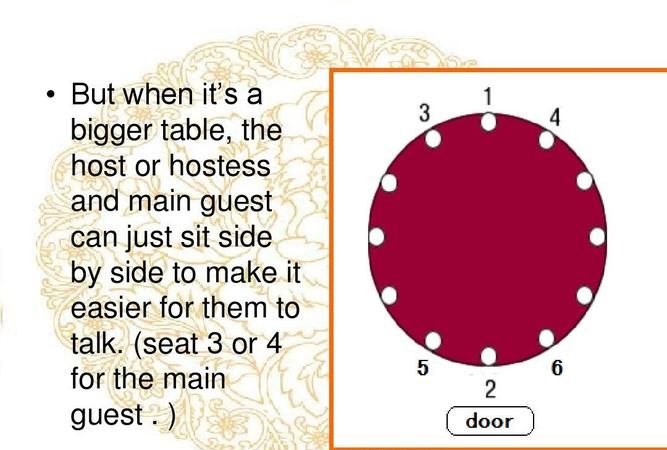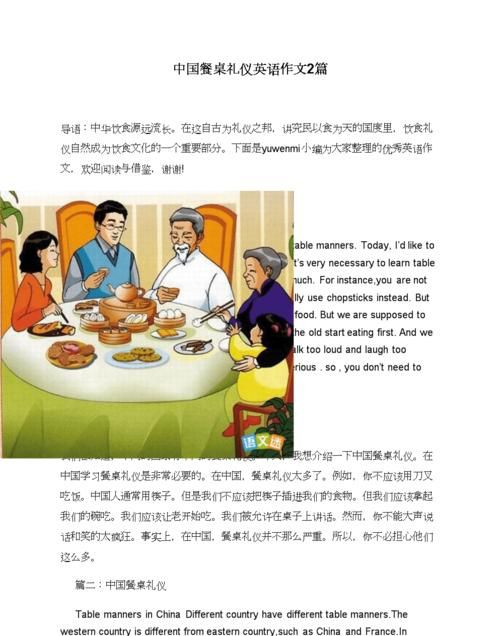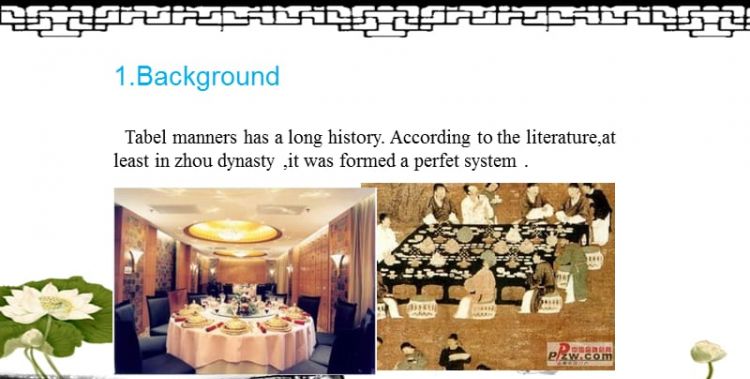本文目录
中西方餐桌礼仪差异英语
现在国内的外国人是越来越多了,他们热爱中国 文化 。那么作为主人,在外国友人不会中文的情况下,适时的学习中方餐桌礼仪英语也是有必要的。下面我就为大家搜集了5条中方餐桌礼仪英语,希望能够帮到你哦!
中方餐桌礼仪英语一、
让客人和长辈先吃每一道菜
let the elder people and the customer eat first
中方餐桌礼仪英语二、
不要用筷子敲碗
don't use the chopsticks hit the bowl
中方餐桌礼仪英语三、
为主人的长寿、健康、成功干杯
wish for the people who host the dinner
中方餐桌礼仪英语四、
等大家到齐了,才开始吃
don't eat until everyone is there
中方餐桌礼仪英语五、
不要将手伸到饭桌对面夹菜
don't reach to get the food on the opposite side

中国餐桌礼仪英语10句带翻译
当有一天,你有外国的朋友来,这个时候你就要为外国友人介绍餐桌上的一切,那么你们知道要怎么办吗?下面是我为大家整理的餐桌上的礼仪英语 ,希望能够帮到大家哦!

餐桌上的礼仪英语
中国饮食在世界上是很有名的。Ibelieve the Chinese food is famous around the world.
假如你来到中国,中国朋友请你吃饭,你就需要了解一下有关宴会中的座次问题。Andif you are in China and you are asked by your Chinese friend to a dinner, youmay want to know how to pick up your seat at the table and what is the properway to sit at the table.
这个位子一般是主位,是主人的。Well,normally this seat is the seat for the host or the hostess.
这个位子面朝着门。(面朝着门的一般是主位。)Theseat is facing the door of this room.
也可以根据餐巾的样式来辨别座位。Onemay also distinguish the seats at the table from the style in which the napkinsare folded.
无论餐巾折成什么样式,最高的餐巾对应的座位,一定是主位。Regardlessof how the napkins are arranged.,thetallest arrangement will always correspond to the master seat.
一张坐四五个人的小桌子,与主人的座位相对应的背对着门的那个位置则是被邀请的主客坐的位置。Atthe small table, a table for four of five, the seat right across of the hostseat, the seat over there, the back of which is facing the door is the seat forthe main guest.
当然如果桌子大一点的时候,比如说可以坐十到十二个人的桌子,由于主人和客人说话不太方便,跨越桌子就像跨越一片大海一样,所以他们可以挨着坐,这种情况下是可以挨着坐的,这样坐主人和客人说话更方便一些。Butusually of course, when it’s a bigger table, a table for ten or twelve, and itis not easy for host or hostess talking with the main guest, right across thetable like right across the ocean and they can just sit side by side which canmake it easier for them to talk.
我想你也注意到了在桌子上还有一个小桌子,就是可以转动的这个。Andon the table I suppose you have noticed that there is something like this, it’sa smaller table on the big table.
可以叫它LazySusan。AndI suppose you call it Lazy Susan.
Lazy Suzan
对,它可以方便客人夹菜。Yeah,this can make things easier for us.
因为在中国的宴席上,我们并不是谁点的菜谁吃。Becausein the Chinese way of having food,wedon’t order our own food.
而是为所有人点菜,大家一起分享食物。Weorder for everybody and everybody shares the food on the table.
我们经常会采取桌上的人每人点一个菜的方式。Andusually we can have each of the people at the table to order one of the dishes.
那么如果我想吃的菜在桌子的另一边,比如说我想吃鸡肉,我就可以转动这个小桌子,让鸡肉转到我这一边来。Sowhat if something I want is on the other side of the table, for instance if Iwant the chicken, so I can turn the Lazy Susan and turn the chicken to my side.
这样不用站起来就可以够到菜,因为站起来夹菜是不礼貌的。Ican just pick it up without standing up and reaching out which is not proper orpolite in Chinese table manner.
另外还要注意当别人夹菜的时候,这个时候你最好不要转动这个小桌子。Andof course when someone else picks the dishes you are not gonna turn the tableat that time, turn lazy Susan at that time.
你知道为什么我坐在这儿而不是坐在那儿吗?Anddo you know why I just sit hear rather than there?
因为坐在那儿的人要负责买单。Becausethe one sitting there is gonna pay the bill.
中国的宴席中一般都有敬酒的习俗。MostChinese people have the tradition of making toasts at banquets.
敬酒的顺序通常要按照年龄先长后幼、职位由高到低或者先主宾后次宾的顺序。Theorder on the toast may be based on age from the eldest to the youngest bysocial position from high to low, or by guest status from principal tosecondary.
只有充分考虑到敬酒的顺序,才能达到敬酒的效果,使大家皆大欢喜。Onlyif the individual proposes the toast in a correct and reasonable manner, wouldthe toast be well received and appreciated.
在宴席上饮酒的过程中,随时都可以敬酒,而且可以向同一个人多次敬酒。Onemay propose a toast at any time throughout the meal, and making several toaststo one person is acceptable as well.
当杯中的饮料少于一半时,主人通常会为客人斟满。Ifthe guests’ glasses are less than half full, the host will help refill glassesfor them.
斟酒的次序同敬酒的次序一样也是有长幼高低之分的。Theorder in which this takes place is similar to that of proposing toasts, placingthose of higher social status first.
在与长辈或地位高的人碰杯时,人们为了表示自己的谦虚和对对方的尊敬,往往会让自己的杯口低于对方的杯口。Whenpeople make a toast to a person superior, they usually make sure that rim oftheir glass clinks at position lower than rim of the other person’s glass,which expresses respect and modesty.
为了表示热情,主人通常还会不停地劝客人多吃一点。Toshow good hospitality, the host usually urge the guest to eat more.
遇到孩子或者特别亲近的人,甚至还会亲自为客人夹菜。Forchildren, relatives or close friends, they will even serve the dishesthemselves.
客人通常要友好地接受,并且表示感谢。Theguests are supposed to accept the serving and kindly show their appreciation.
即使遇到自己不喜欢吃的菜,也不要拒绝,放到自己盘子一边就可以了。Evenif they do not like the particular dish, they do not refuse the serving assimply accept it and leave it at side of their plate.
另外,在中国的饭店吃饭可以不用另外付小费。Eatingin the restaurant in China, tips are not necessary.
干杯Bottomup! 【Drinkup! / Cheers!】
买单Paythe bill.
餐巾napkin
中国餐桌上常用的礼仪
1.让客人和长辈先吃每一道菜
let the elder people and the customer eat first
2.不要用筷子敲碗
don't use the chopsticks hit the bowl
3.不要将手伸到饭桌对面夹菜
don't reach to get the food on the opposite side
4.等大家到齐了,才开始吃
don't eat until everyone is there
5.为主人的长寿、健康、成功干杯
wish for the people who host the dinner
中国餐桌礼仪英文
Chinese table etiquette boils down to the following points:
1. Admission etiquette. Ask guests seated on the seats. Please elderly guests in attendance were seated next to attendance at from the left side into the chair. Admission Dongkuaizi not after. What more do not come to beep. Not to get up walk. If what happened to the owner notice.
Second, when the meal. Ask guests. Long the Dongkuaizi. Jiacai, each less. Far from the food on their own eat some. Meal not a voice. Heshang also not a sound use Kaitang I spoon a small drink and a small mouth. Pawan front-lips not drink, soup, hot cool after Zaikai. side not to drink while blowing Some people prefer to chew food to eat. extraordinary feel like work is crisp chewing food, a very clear voices. this is not etiquette demands. extraordinary and everyone is eating together, as far as possible to prevent the emergence of this phenomenon.
Third: Do not eat hiccup, other voices will not arise if there sneezing, Changming involuntarily, such as the sound, it is necessary to say "I am sorry."; I am sorry;. "Of the original cooler." Within the words . to show regret.
Fourth if guests or elders give cloth dish. Best use of chopsticks may also be the guests or elders far away from the dishes to their front, according to the habit of the Chinese nation. Dish is a one of the Top. If the same tables leadership, the elderly, the guests said. Whenever of a new dish, let them first Dongkuaizi. rotation or invite them to the first Dongkuaizi. to show their importance.
Fifth: eat the head, fishbone, bones and other objects, not Wangwaimian vomit, not onto the ground still. Slowly to get their hands Diezili, or close on their own or on Canzhuobian prepared beforehand good on paper.
Sixth: To a timely manner about the time and people just a few humorous, to reconcile the atmosphere. Guangzhaotou not eat, regardless of others, and do not devour and destroy the lavish meal, not jail sentence.
7: It is best not to the dinner table Tiya if it is to Tiya, will use napkins or sign blocked their mouths.
8: To clear the main tasks of the meal. Must be clear to do business oriented. Feelings or to the main contact. Mainly or to eat. If it is the former, when attention should be paid to the seating arrangements. Their main negotiators the seats near each other to facilitate conversations, or dredge emotion. If it is the after. need only pay attention to common-sense courtesy on the line, to focus on the appreciation of dishes,
9: The last time left. Must be expressed gratitude to the host. At the invitation of the owner or to their own homes after the house to show back
China is the etiquette of helping people, Minsishiweitian, dining How can no rules! While stressing that no attention is three meals a day, but do not know know better than OK!
1. Inviting guests to notice, Ruxi 6:00, 5:50才叫your elderly guests, it does not. 2. Hosts who looked to be late; guests should be 5-10 minutes late, and this is very considerate guests Oh, and pay attention to grasp, natural host and the guest are Huan. 3. If sit round a table, facing the door of the main blocks, or back * walls, counters; emphasize some hotels will be used napkins distinction, the highest position napkins can not casually sit Oh, unless you intend to good banquet woven?: D
4. Masters of the subject and object of the right hand side, the left hand side of the important guests; * gate facing the master, of course, is run errands entertain the Peiqia sit you. 5. Guests do not directly to the members of a la carte and calling guidance, obediently waiting for the hosts who looked to be a la carte if guests really serious taboos or hobbies, and should be gently told the hosts who looked, the owner of natural putting his interests and meet guests little or significantly requirements. 6. Hosts who looked not need points or less grasping points, or holding food dishes, such as crab, lobster legs, ribs, and so on. For a meal to the three dishes such a rule no. What can be said etiquette! 7. Not a small amount of force will not object to others drink wine without fragmentation feast! 8. On the wine servings! Foreigner likes to boast of skill, people may boast their own point-for the food, hosts who looked at carefully observed Liangcai Qi, every Cup have drinks later, when immediately drank to welcome the start. . . Like, rotating disk or right hand side indicate the subject and object moving first chopsticks. Tuirang subject and object should not be too long, oh, we stomachs are hungry, it will eat you open! Do not forget to eat the praise of some oh. 9. After one of every dish, although the waiter and owner will still go before the subject and object, but not too rigidly stick with you, if just in front of me, dead people rotating disc, I would first folder a small taste of chopsticks ! 10. Hosts who looked often to the disk will cater to the vast majority of guests; Peiqia then added services to entertain; guests can not touch the hands of disk integrity and eat meals, the two sides are also Huan you. 11. If there is no attendant at the food or chopsticks, Gongbiao, Jiacai the first time can be good, must not use their own chopsticks to pick in the session to pick, and even stirring! Not everyone is like love, like you do not mind the saliva chopsticks! Usually identified from their recent selection part. 12. Let chopsticks on the best food in their transition to a dish in only into the mouth. Phase seem to be eating is not so urgent. 13. When chewing food in the mouth, remember Bijin lips is a major event, so to speak, falling objects, Shishui spills, as well as to avoid a "Puma Puma Ji Ji" annoyance beep. 14. During the meal, or both before and after the meal, should be back straight, as far as possible but not later * chairs sit. During the meal, basically in the hands above the desktop. 15. The master of a very good appetite, and weight loss are guests, not the Fanju oh.
中国餐桌上的礼仪归结为以下几点:
一.入座的礼仪.先请客人入座上席.在请长者入座客人旁依次入座,入座时要从椅子左边进入.入座后不要动筷子.更不要弄出什么响声来.也不要起身走动.假如有什么事要向主人打招呼.
第二,进餐时.先请客人.长着动筷子.夹菜时每次少一些.离自己远的菜就少吃一些.吃饭时不要出声音.喝汤时也不要出声响,喝汤用汤匙一小口一小口地喝.不宜把碗端到嘴边喝,汤太热时凉了以后再喝.不要一边吹一边喝.有的人吃饭喜欢用咀嚼食物.非凡是使劲咀嚼脆食物,发出很清楚的声音来.这种做法是不合礼仪要求的.非凡是和众人一起进餐时,就要尽量防止出现这种现象.
第三:进餐时不要打嗝,也不要出现其他声音,假如出现打喷嚏,肠鸣等不由自主的声响时,就要说一声"真不好意思".;对不起;."请原凉".之内的话.以示歉意.
第四;假如要给客人或长辈布菜.最好用公筷.也可以把离客人或长辈远的菜肴送到他们跟前,按我们中华民族的习惯.菜是一个一个往上端的.假如同桌有领导,老人,客人的话.每当上来一个新菜时就请他们先动筷子.或着轮流请他们先动筷子.以表示对他们的重视.
第五:吃到鱼头,鱼刺,骨头等物时,不要往外面吐,也不要往地上仍.要慢慢用手拿到自己的碟子里,或放在紧靠自己餐桌边或放在事先预备好的纸上.
第六:要适时地抽空和左右的人聊几句风趣的话,以调和气氛.不要光着头吃饭,不管别人,也不要狼吞虎咽地大吃一顿,更不要贪杯.
第七:最好不要在餐桌上剔牙.假如要剔牙时,就要用餐巾或手挡住自己的嘴巴.
第八:要明确此次进餐的主要任务.要明确以谈生意为主.还是以联络感情为主.或是以吃饭为主.假如是前着,在安排座位时就要注重.把主要谈判人的座位相互靠近便于交谈或疏通情感.假如是后着.只需要注重一下常识性的礼节就行了,把重点放在欣赏菜肴上,
第九:最后离席时.必须向主人表示感谢.或者就此时邀请主人以后到自己家做客,以示回
中国人乃礼仪之帮,民以食为天,用餐岂能没有规矩!虽然说讲不讲究都是一日三餐,但是知道总比不知道好吧!
1。请客要早通知,6:00入席,老人家你5:50才叫客人来,不对吧。2。主人家不能迟到;客人应当迟到5-10分钟,这是非常体贴的客人哦,注重把握,自然宾主皆欢。3。要是坐圆桌子,对着大门的是主座,或是背*墙、柜台的;讲究些的饭店,会用餐巾予以区分,餐巾最高大的位置不能随便坐哦,除非你打算好请客喽:D
4。主人右手边的是主客,左手边的是次重要的客人;*门边面对主人的,自然是跑腿招呼的陪客坐的啦。5。做客人的不能直接向点菜员吆喝指点,应该乖乖坐等主人家点菜;假如客人确实有严重的忌口或爱好,应当轻轻告诉主人家,主人自然要替他做主,满足客人小小或大大的要求。6。主人家,不点或少点需要用手抓或握着吃的菜,比如蟹、龙虾腿、排骨等等。一顿饭来上三个这样的菜就没治了。还有什么礼仪可讲!7。不勉强也不反对别人少量饮酒,无酒不成宴嘛!8。上酒水上菜了!老外喜欢自夸手艺,国人可不作兴吹嘘自己点的菜,主人家细心观察凉菜上齐、每位杯中都有酒水后,当立即举杯,欢迎开始。。。之类的,转动圆盘或是示意右手边的主客动第一筷。主客可别推让太久哦,大家肚子都饿了,就等你开吃了!吃了的别忘了赞美一下哦。9。之后的每道菜一上来,虽然服务员与主人还是会转到主客面前,但并不用太拘泥啦,假如正好在我面前,又没人转动圆盘,我也会先夹一小筷子尝尝的!10。主人家要经常转圆盘,照顾到绝大部分客人;陪客则补充招呼服务一下;客人的手能不碰圆盘而吃完整餐,则宾主又皆欢啦。11。假如没有服务员分菜或是公筷、公勺,夹菜的时候可要先看好,切不可用自己的筷子在盘中挑来拣去,甚至搅拌!不是每个人都像爱人一样不介意你筷子上的口水的!通常看准了拣距离自己最近的那部分。12。最好让筷子上的食物在自己的接碟中过渡一下,才送入口中。可以使吃相看起来不是那么急切。13。食物在口中咀嚼时,切记的大事就是闭紧双唇,以免说话、物体掉落、汁水外溢,以及免得发出"骠叽骠叽"的倒胃口声响。14。无论是用餐期间或用餐前后,都应当背部挺直,尽量往后坐椅子而不*。用餐期间,基本上双手都在桌面以上。15。一个太好胃口的主人,和正在减肥的客人,不适宜这样的饭局哦。


以上就是关于中国餐桌礼仪英语0句带翻译 ,中西方餐桌礼仪差异英语的全部内容,以及中国餐桌礼仪英语10句带翻译 的相关内容,希望能够帮到您。

